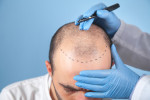Bariatric surgery is a significant step towards achieving weight loss and improving overall health. Proper post-operative care is crucial for ensuring the success of the surgery. It will also help maintain long-term health. This guide provides essential care tips and recommendations for patients after bariatric surgery.
Immediate Post-Surgery Care
The first few days after surgery are critical for recovery:
- Rest and Recovery: Take adequate rest and avoid strenuous activities. Your body needs time to heal following the procedure
- Follow Surgeon’s Instructions: Adhere to all post-operative instructions given by your surgeon. This includes medication schedules, wound care, and dietary guidelines
- Hydration: Drink plenty of water, but take small sips to avoid overloading your stomach
Dietary Guidelines
Your diet will change significantly after bariatric surgery:
- Phase 1 - Liquid Diet: Start with a clear liquid diet for the first few days. This includes water, broth and clear juices.
- Phase 2 - Pureed Foods: Gradually transition to pureed foods for the next few weeks. Include blended soups, smooth yoghurt, and pureed fruits and vegetables.
- Phase 3 - Soft Foods: After the pureed phase, introduce soft foods like scrambled eggs, soft-cooked vegetables, and canned fruits.
- Phase 4 - Solid Foods: Slowly reintroduce solid foods, focusing on nutrient-dense options and avoiding foods that are high in sugar and fat.
Protein Intake
Protein is crucial for healing and maintaining muscle mass:
- High-Protein Foods: Incorporate high-protein foods into your diet. This can include lean meats, fish, eggs, and low-fat dairy.
- Protein Supplements: Use protein supplements if recommended by your dietitian to meet your daily protein requirements.
Hydration
Staying hydrated is essential for recovery following bariatric surgery:
- Drink Water: Aim for at least 64 ounces of water daily. Avoid sugary drinks and caffeine.
- Small Sips: Take small sips throughout the day to prevent overloading your stomach.
Vitamins and Supplements
Due to reduced food intake and absorption changes, supplements are necessary:
- Multivitamins: Take a daily multivitamin to prevent nutrient deficiencies.
- Calcium and Vitamin D: Ensure adequate calcium and vitamin D intake to support bone health.
- Iron: Iron supplements may be needed, especially for menstruating women.
- Vitamin B12: Regular vitamin B12 supplements or injections may be necessary to prevent deficiency.
Physical Activity
Gradual physical activity helps in maintaining weight loss and overall health:
- Start Slowly: Begin with light activities such as walking. Gradually increase the intensity and duration as you heal.
- Strength Training: Incorporate strength training exercises to build muscle mass and boost metabolism.
Regular Follow-Up Appointments
Regular monitoring by your healthcare provider is crucial:
- Scheduled Visits: Attend all follow-up appointments to monitor your progress and address any concerns.
- Blood Tests: Periodic blood tests will check for nutrient deficiencies and overall health status.
Conclusion
Proper care after bariatric surgery is essential for a successful recovery and long-term health. Follow these guidelines to ensure the best possible outcomes and maintain your weight loss goals. Always consult with your healthcare provider for personalised advice and support throughout your journey.
For more information and to book a consultation visit the ACIBADEM Beauty Center.
Frequently Asked Questions
Focus on a high-protein, nutrient-dense diet. Follow the recommended phases from liquids to solid foods.
Aim for around 2 litres of water daily, taking small sips throughout the day.
Reduced food intake and absorption changes make it essential to take supplements. This will help prevent nutrient deficiencies.
Start with light activities like walking and gradually increase intensity as you heal. Consult your doctor before starting any exercise regimen.
Follow dietary guidelines, stay hydrated, take supplements and engage in regular physical activity.














